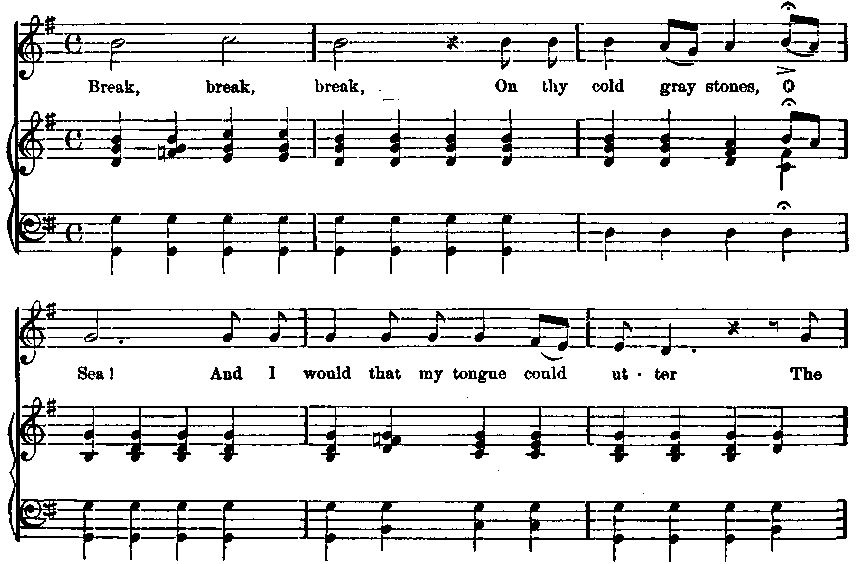Familiar Songs - Their Authors & Histories
300 traditional songs, inc sheet music with full piano accompaniment & lyrics.
| Share page | Visit Us On FB |
|
BREAK, BREAK, BREAK. |
37 |
||
|
BREAK, BREAK, BREAK.
Alfred Tennyson, the first of living poets, is less known outside of his poetry, as a man among men, than almost any of his professional brothers. How he looks and speaks, what he loves and hates, what is his creed, religious or political, have not been revealed, even to his own countrymen. Mr. James T. Field's lecture on him has afforded almost the only glimpses we have of the huge and rather unkempt person, gruff manners, and egotistical conversation, which make up a somewhat unattractive picture. Even the date of Tennyson's birth, which took place in Somerby, Lincolnshire, where his father was rector, seems to be in doubt, being given as 1809 or 1810. He was the third of twelve children, and those who have heard Mr. Fields, will recall the amusing incident that reveals a family trait. A bold hunter had bearded the lion in his den, and on being shown into Tennyson's reception-room, saw a taciturn-looking gentleman sitting there, evidently at home. Approaching him, the visitor said blandly, " Have I the great pleasure of beholding Mr. Tennyson ? " The tall figure drew itself up at full length, and in a gloomy voice replied, "I am not Alfred,—I am Septimus, the most morbid of them all." The perfect lyric " Break, break, break," was written to commemorate the same event that called forth *' In Memoriam," the death of the author's early friend, Arthur Henry Hallam, son of the historian of the " Middle Ages." The lament was given its appropriate musical expression, in the melody composed by William E, Dempster, who set other lyrics of Tennyson's which have become so well known, that a choice for this book was as difficult as it was necessary. "The May Queen," and "Turn, Fortune, turn thy wheel," will readily recur. The music was dedicated to Mrs. Browning,—not the poetess, but an old and valued friend of the composer';', still residing at Aberdeen, Scotland. Mr. Dempster's character was well calculated to call forth life-long friendships. Mrs. Browning writes, " He was as amiable, kind, and warm-hearted a man as I ever knew, and his moral character was unexceptionable." |
|||
 |
|||